It’s Syllabus Day!
Let’s talk:
Course Schedule
Editorial Services
Recommended Readings
Now that we’ve officially launched, what can you expect from “The Gentle Editor”?
Starting Wednesday, May 7th, you’ll receive:
A bi-weekly writing lesson with practical advice & craft tips
Reading recommendations for further study
Access to my inbox, where you can submit up to 1,000 words of an essay, novel, or short story for a one-time, free editorial sample
Paid subscribers also receive:
Writing prompts + homework exercises to practice what you’ve learned
Access to the comments section where you can swap your work with other writers
Behind-the-scenes content to take you further in your writing journey
To get the most out of these writing lessons, I highly recommend taking advantage of the paid subscription.1
The homework exercises and comments section are where the water starts to boil with this newsletter. Workshopping is one of the best ways for you to practice what you’ve learned and gain insights from other storytellers. Writing can be lonely work, so let’s encourage one another on our literary journeys!
1. Course Schedule
A sneak peek of our writing lessons for the next three months:
MAY
THEME: Online Writing / Blogging
May 7th - “How Long Should a Blog Post Be?”
May 21st - “Write for an Audience of One”
JUNE
THEME: Word Choices
June 11th: “The Golden Rule of Writing”
June 25th: “1 + 1 = 1/2”
JULY
THEME: Strong Prose
July 9th: “What’s the ONE THING You Want to Say?” (Thesis Development)
July 23rd: “Keep Those Zombies Out of Your Essays” (Active vs. Passive Voice)
2. Editorial Services
Do you have a passion project you’d like professional feedback on? I would love to work with you one-on-one!
If you’d like personalized feedback on a manuscript, rough draft, or collection of short stories or essays, here’s a peek at the various editing packages I offer:
A. The Coaching Package For essayists, bloggers, screenwriters, and short storytellers who want to refine their craft A combination of developmental & line edits, including: • Feedback on story structure, plot development, character arcs, and continuity (Fiction) • Notes on literary structure, organization, and thesis development (Non-fiction) • Summary analysis of strengths, weaknesses, and areas for improvement • Recommended readings for craft development The coaching package is designed to teach you how to become a stronger, more persuasive writer. With this package, writers may submit multiple short stories, personal essays, or blog posts for review. Cost: $0.02 per word (minimum $50.00 fee) Screenplays: $1.00 per page *** B. The Developmental Package For authors who have just completed the first or second draft of their manuscript An assessment of large-scale storytelling elements, including: • Fiction: story structure, plot development, world-building, character arcs, and through-lines • Non-fiction: literary structure, chapter organization, and thesis development This package provides you with a thorough manuscript critique designed to equip you for the revision process, teaching you how to make your narrative more cohesive and engaging. Cost: $0.04 per word (includes 2 manuscript reviews) *** C. The Line Editing Package For authors who have revised their manuscript but want to polish their sentence-level writing A detailed look at sentence-level issues, including: • Grammar • Punctuation • Sentence structure • Vocabulary • Dialogue The goal of the line editing package is to correct technical errors and offer stylistic suggestions intended to reduce redundancy and increase clarity. Cost: $0.03 per word
3. Recommended Readings
(totally optional but highly encouraged)
There are only two tried-and-true ways to become a better writer:
WRITE a lot—even if it’s bad at first. Just write out the rubbish until you strike gold.
READ widely—novels, memoirs, biographies, and most importantly, craft books. (No, I don’t mean books about origami or pottery.)
I used to think that if I simply read classical literature—Jane Austen, Charles Dickens, Tolstoy, etc.—I would *magically* become a better writer through osmosis.
Yes, reading great literature is essential, but what I discovered during graduate school is that writing is like cooking. Simply eating at fine dining restaurants will not transform you into a gourmet chef. At some point, you need to crack open a cookbook and measure, season, and baste in your home kitchen.
Included in “The Gentle Editor” paid subscriptions are weekly reading assignments. These are 100% optional, but if you want to start cooking with oil, I highly recommend investing in a few of these books. (Most you can order second-hand from Amazon or other discount book retailers!)
Here are my top reading recommendations:
Bird by Bird by Anne Lamott2
Stein on Writing by Sol Stein3
Reading Like a Writer by Francine Prose4
Characters, Emotion, & Viewpoint by Nancy Kress5
On Writing Well by William Zinsser
Save the Cat! Writes a Novel by Jessica Brody6
Story Genius by Lisa Cron
Creating Character Arcs by K.M. Weiland
Plot & Structure by James Scott Bell
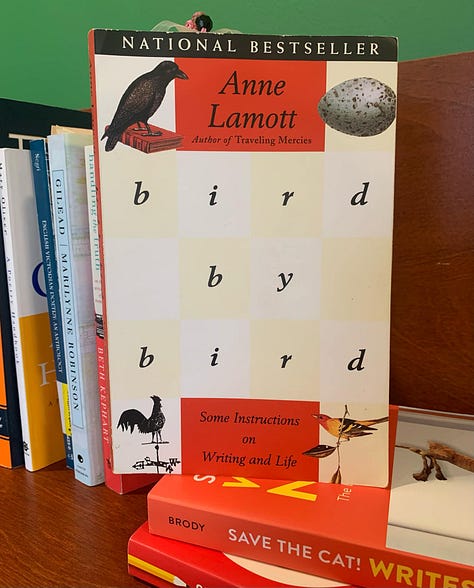
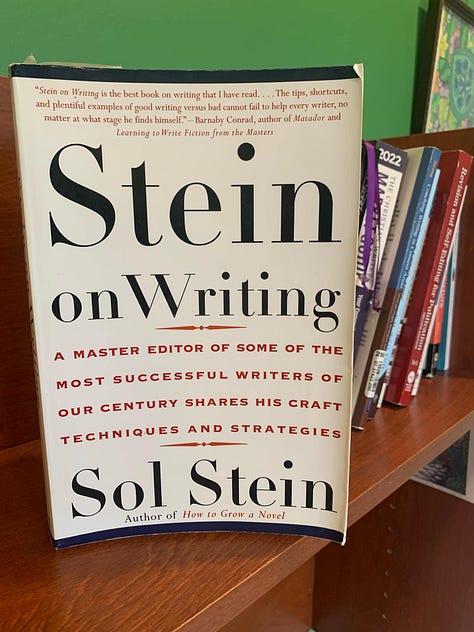
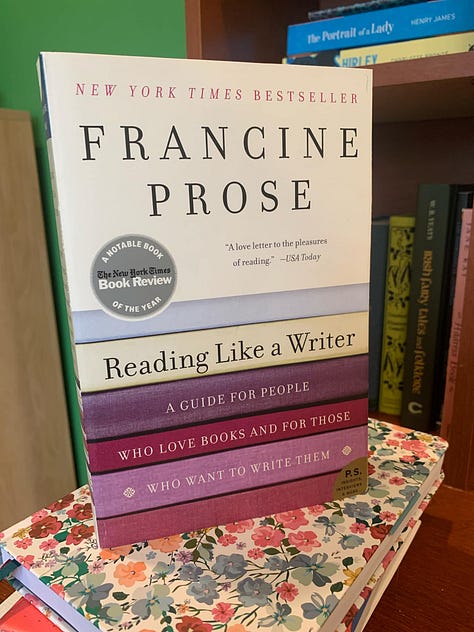
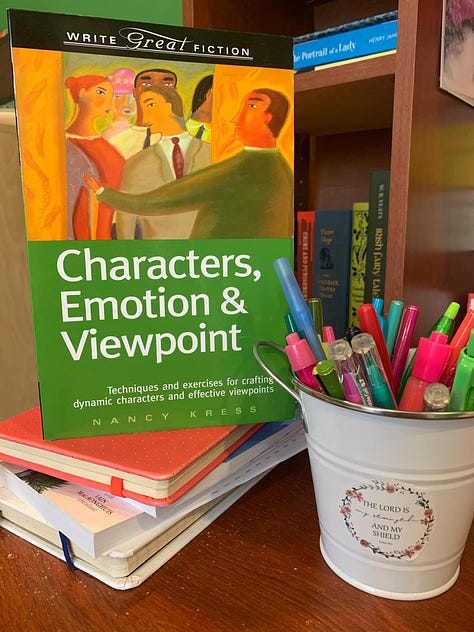
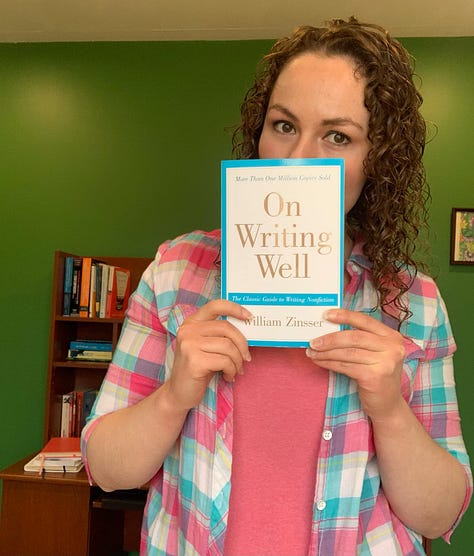
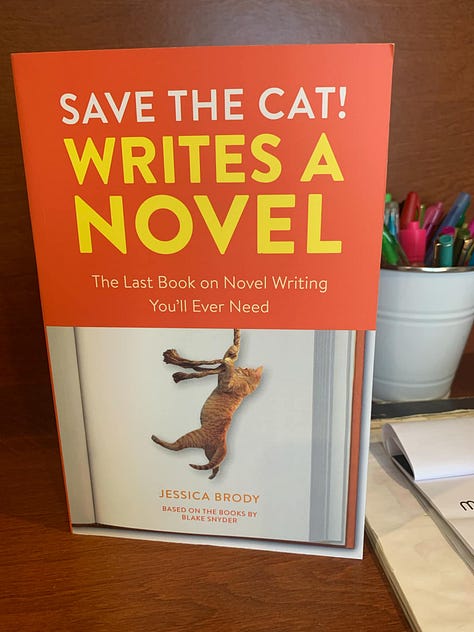
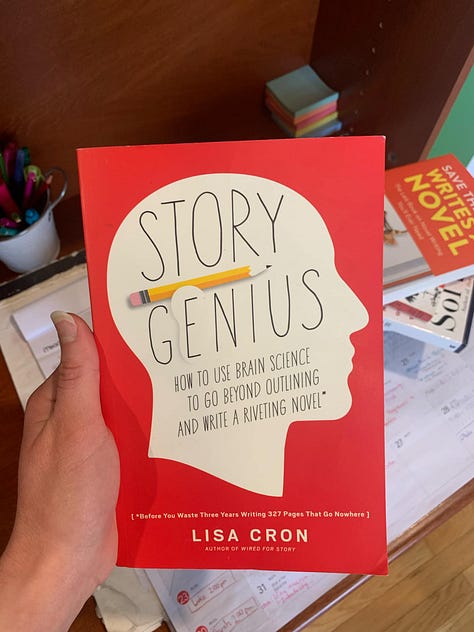

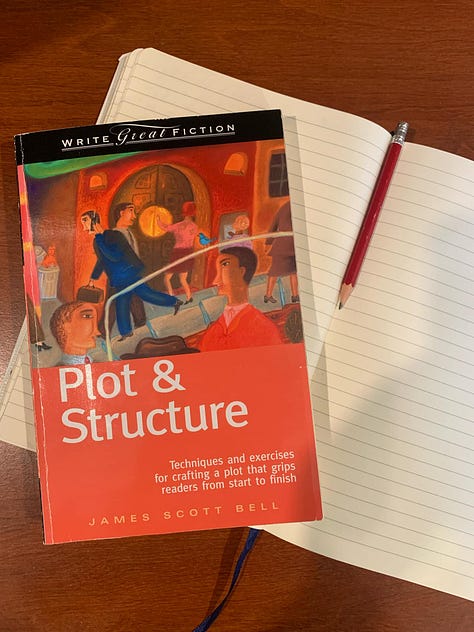
Remember, you don’t need to buy all of these in one go. Research the ones most relevant to your current writing project, and then invest in more as needed. (I’ve been building up my library for the past four years!)
Well, that’s all for now, my fellow creatives! As we gear up for next month’s lessons, why don’t you introduce yourself in the comments section?
Leave a comment with your favourite book and a brief description of your current work-in-process (or your dream project!).
Paid subscriptions are $7.00/month for Canadian subscribers or approximately $5.00/month for American subscribers (according to the last time I checked the exchange rate).
If you’re brand new to writing (or are stuck in a writing rut), I strongly encourage you to start with Anne Lamott’s Bird by Bird. It’s a witty, humorous, gentle reminder that writing is its own reward.
Please note that I do not agree with all of Stein’s writing advice. His chapter on love scenes, for example, includes tips for writing sex scenes which I do not endorse. However, his book helped me tremendously in improving my craft. It was a required reading for one of my MFA courses, and I heartily recommend it!
Francine Prose taught me how to maximize the power of every word I put down on paper. Her book also taught me volumes about the art of dialogue (a component of my writing/editing that clients have since complimented me on!)
Kress’ book covers exactly what it promises: the building blocks of character development, the art of conveying emotion, and the pros and cons of each POV. A must-read for any novelist!
I wish Save the Cat! had been a required reading during graduate school. Had I read it three or four years ago, it would have saved me a lot of time and frustration with my novel-in-progress. This book was a major “Aha!” moment for me. Another must-read for any novelist!

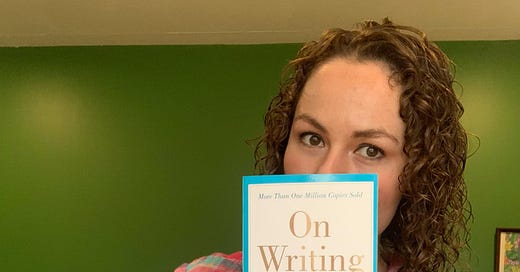



Allana, thank you for this list of resources! I’ve read Bird by Bird and On Writing, I think next will be the Save the Cat one! I’ve just finished the first rough draft of my testimony story (how God saved me out of the pit of a mental health breakdown). Now I’m revising that before seeking some developmental help. Glad to have your information.
Thank you, Allana.
Your website is beautiful!